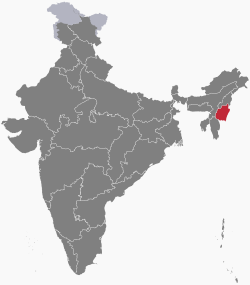| Part of a series on |
| Ningthouja dynasty |
|---|
 |
| Info: Kings until Telheiba have a difference in dating of 1 year less by K.C. Tensuba from that of the Cheitharol Kumbaba. |

This is a list of monarchs that ruled the Kingdom of Manipur (present-day Manipur state) as they are recorded in the Royal Chronicle of Manipur ( Cheitharol Kumbaba ). [1] The Chronicle was reconstructed during the 18th century, with unknown provenance of the earlier sections and, according to scholars, its historicity is assured only for the portions after 1485. [2]
Contents
- Ancient Rulers
- Proto-Meitei rulers
- Great Historical Gap
- Continuity of Khuman and Luwang lineage
- Luwang Salai clan rulers
- Mangang dynasty (33–1972 CE)
- Burmese rule in Manipur (1819–1825 CE)
- Princely State of Manipur (1825–1947 CE)
- Dominion of India and Republic of India
- See also
- References
- External links
The Kingdom of Kangleipak with written constitution was established in 1110 CE by Loiyumba, ruler of Kangleipak State who incorporated most neighboring principalities. [3] The Kangleipak kings expanded their territory, reaching their zenith under king Khagemba (1597–1652 CE). In 1714, a king named Pamheiba adopted Hinduism. He adopted the name Gharib Nawaz, and in 1724 renamed the kingdom as "Manipur" (Sanskrit for "abode of jewels"). Manipur was conquered by Burma in 1819 CE, and became a Princely State within the British Raj in 1825 CE till 1947 CE. [4]
On 11 August 1947 CE, Maharajah of Manipur Bodhchandra Singh signed the Instrument of Accession [5] joining the Union of India while retaining internal autonomy. In October 1949, he further signed a merger agreement with India allegedly under coercion. [6] Manipur then became a part C state of the Republic of India governed by the Constitution of India. [7]